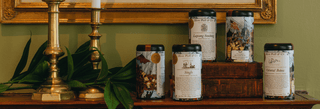Dear Oliver,
To follow up my previous letter, I would like to focus on just a little more information this month to highlight the important role South Carolina played in the history of tea imports in the Revolutionary era. In addition to the oft reported Charleston Tea Party of 1773, two additional ships sailed into the Charleston Harbor in 1774 bringing the forbidden cargo into port—culminating in a tea-dumping event with an interesting name.
The first incident occurred in June 1774 when Captain Richard Maitland of the ship Magna Carta entered the city and registered three crates of tea at the local customs house. It is reported that he intended to sell these to local merchants. His plans went awry when this was discovered by local officials, and he pledged to return the tea to England or destroy it himself. Rumors prevailed that this was not his true intention, and local men went searching for Maitland. Not finding him, they boarded the vessel and subsequently took the disputed tea to the Exchange Building, which was already holding the previously confiscated crates.
During this frantic search, Captain Maitland took refuge on another ship the HMS Britannia. But, as also noted in the Oliver Pluff & Co. History of Tea section, this ship was soon to stir up controversy as well.
After returning Maitland to England, the ship returned to South Carolina waters carrying another seven crates of tea. HMS Britannia captain Samuel Ball, Jr. declared himself innocent regarding the importation of forbidden tea, blaming his subordinates among others for loading the crates while simultaneously claiming that he had affidavits saying the tea was not his.
According to Legends of America, the local General Committee, which was responsible for decision making regarding the imports of the time, decided to either believe Ball or simply to let it pass and the group proceeded to finally dump the offending chests of tea into the Cooper River, dubbing the entire endeavor Oblation to Neptune.
The South Carolina Gazette reported, “on Thursday at Noon, an Oblation was made to Neptune of the said seven chests of Tea by Messrs. Lindsay, Kinsley, and Mackenzie themselves, who going on board the Ship in Stream, with their own Hands respectively stove the Chests belong to each, and emptied their Contents into the River…in View of the whole General Committee on the Shore besides numerous Concourse of People, who gave three hearty Cheers after the emptying of each Chest, and immediately after separated as if nothing had happened.”
This, as noted in Legends of America, was the final tea-related dispute of the
Revolutionary era in Charleston (Charlestown).
Hear. Hear. Hear.



